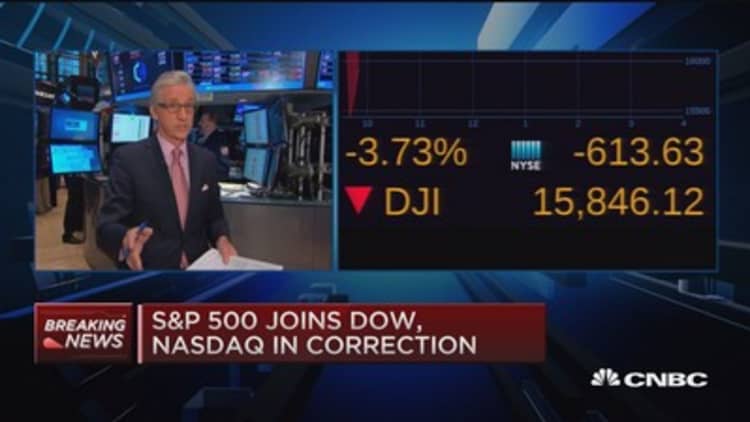
Monday's stock market action was bound to be messy, but it was made even worse by a major technical pile-up just as the session got underway.
Dubbed by one trader "1,000 flash crashes," the market opened to tumult in which multiple stocks and in particular exchange-traded funds cascaded lower as orders failed to get filled and prices went ballistic.
In all, 1,278 so-called circuit breakers—trading halts imposed when shares fall to various levels—were tripped across the major exchanges as the Dow Jones industrial average surrendered more than 1,000 points early on, according to New York Stock Exchange officials. The number of tripped breakers was believed to be a record, with ARCA's 999 the most, with the Nasdaq next at 194. A typical day sees fewer than 10.
Traders speculated that the invoking of Rule 48, which is used to head off panic trading but in this case seemed to chase market makers at the opening, was at fault. The rule allows stocks to open without price quotes ahead of time.
"Bids seemed to vanish," said Dave Lutz, head of exchange-traded funds at Jones Trading.
Lutz said multiple ETFs plunged at the open, were halted, reopened and hit limits, then were halted again.
"Given many of these are U.S. underlying (it's) staggering to me these dislocations," he added. "As stocks broke sharply on the U.S. open, triggering halts, it seems the ETF arbitrage community opted to sit out the first few minutes."
A number of ETFs fell well below their net asset value, or the value of the underlying stocks that make up the respective funds.
Read More Bove: Liquidity posing 'massive' market danger
Those funds losing more than 40 percent of their value at one point included the First Trust Dow Jones Internet Index, First Trust Consumer Discretionary AlphaDEX, iShares Global Healthcare, PowerShares Global Water Portfolio and iShares Russell Mid-Cap Value.
"The flash crashes happened today in the ETF market," said Joe Saluzzi, a principal at Themis Trading. "There was a problem pricing some of these ETFs, and that's something that needs to be looked at."
Traders wrestled with the wisdom of invoking Rule 48.
"Part of the reason they have 48 in place is they don't have the manpower to accurately deal with 2,900 stocks opening and 2,900 stocks where there's going to be this huge imbalance in opening direction, be it buy side or sell side," said Peter Costa, a governor with the NYSE and president of Empire Executions. "Rule 48 gives them time to open accurately."






